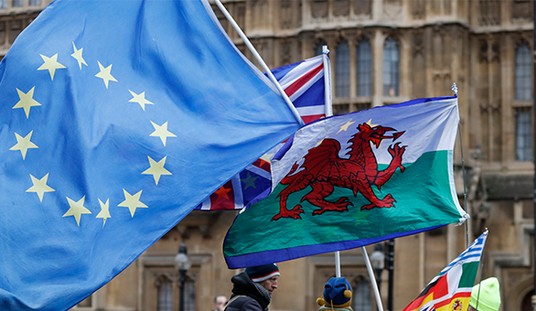Normally when I hear the words “wave election” I think of a tidal wave crashing onto a beach.
Looking at these numbers, the sort of wave I’m picturing is that shot in “The Shining” where blood comes rushing out of the elevators.
Redrum:

What’s more gruesome, the GOP trailing by 48 points — 48 farking points — among all Americans under the age of 35 or the GOP trailing by any margin among one of its most reliable demographics, seniors? No wonder some Dems are chattering about a 40-seat pick-up in the House next year.
Overall Democrats lead 50/39 on the generic ballot, the first time they’ve hit 50 *and* had a double-digit lead since the Obama wipeout of 2008. In 2006, a year after Hurricane Katrina and amid the darkest days of the Iraq war, Democrats led by 10 points on the generic ballot, slightly less than they do now. They went on to recapture the House and Senate that year. A terrifying thought: What would the numbers look like now if the Dow weren’t skyrocketing and the economy were slowing down?
The good news is that the GOP’s 24 hours away from passing a tax reform bill that will give most Americans a tax cut, at least in the near term. The bad news:
Nearly half the American public (47%) disapprove of the tax reform bills passed by the Senate and House and just 26% approve. Another 8% withhold judgement until seeing the final plan and 19% have no opinion. [ Note: the poll was conducted before the final conference version of the bill was released. ] It is also worth noting that strong disapproval (35%) of the proposal far outweighs strong approval (13%)…
Half of the public (50%) predict that the federal taxes they pay will go up with the plan now under consideration by Congress. Just 14% say their taxes will go down.
There’s nowhere to go but up, right? People wrongly think their taxes are increasing; when they find out it’s the opposite, support for the bill and for the party is bound to rise — or so the theory goes. It could happen, but Harry Enten notes that after previous GOP-led tax cuts in 1986 and under Bush 43, the number who thought that the cuts most helped the richest Americans actually rose, not fell, after passage. Combine that with the fact that a pillar of the new bill is slashing taxes for corporations, a sub-optimal reality for a party that’s pitching itself to populists, and it’s a crapshoot whether Republican voters will be more excited to vote for the GOP because of the bill or whether Democrats will be more excited to vote against them.
Because Joe Weisenthal’s right. This definitely will be the Democratic message next year:
It seems like a really simple 2018 election message for Dems is: "They made the corporate tax cut permanent and yours are set to expire."
What's the response gonna be? "Well, you see, The Byrd Rule stipulates that at a 10-year horizon…" lol.
— Joe Weisenthal (@TheStalwart) December 18, 2017
Not so populist-y. One other note about the dynamics of next year: There’s been loads of hype since Tuesday night about how much white suburban voters helped Doug Jones defeat Roy Moore, with good reason. Jones piled up votes among nonwhite voters and benefited from lower turnout generally among Alabama Republicans, but Moore did well enough with rural whites to have won the election if suburbanites had come through for him. They didn’t, an ominous sign that yet another dependable GOP constituency might be less dependable than usual next fall. It may be that the tax bill will have unusually positive effects among suburbanites, since they’re higher-income and will see a more dramatic payoff from the new bill than lower-income taxpayers will. But Nate Silver warns that, for all the buzz about a revolt in the suburbs, Democrats have also overperformed in non-suburban areas in special elections this year. It’s not just one stratum of society that’s trending Democratic right now. It’s a comprehensive backlash.








Join the conversation as a VIP Member